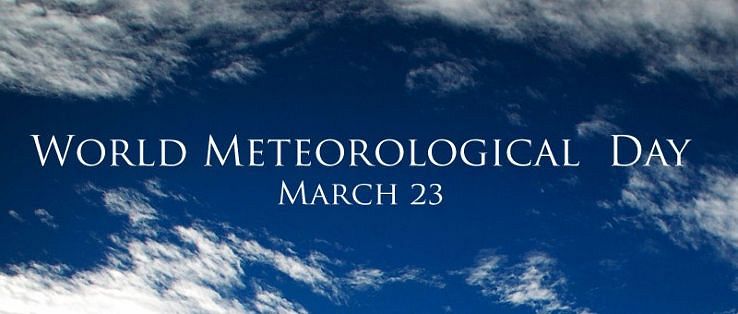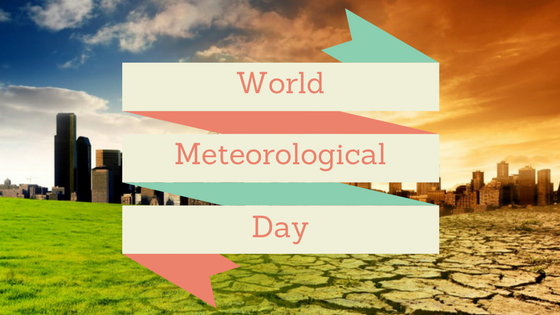World Meteorological Day: What, When and Why Do We Celebrate?


Every year on 23 March, World Meteorological Day takes place and commemorates the coming into force of the Convention establishing the World Meteorological Organization.
It showcases the critical contribution of Hydrological Services and National Meteorological Services to the well-being of society. Meteorological Day is celebrated with various activities around the world. Moreover, multiple themes are chosen for World Meteorological Day, and each theme selected reflects topical climate, weather, or water-related issues.
Every year, the World Meteorological Organization announces a slogan for this Day. All the members of the countries celebrate this Day. The organization has a membership among territories and 191 countries. The Day is celebrated with pride to honor the entry into force of the Convention that has formed the World Meteorological Organization.
World Meteorological Day information highlights the contribution of National Meteorological Services taken to make the society safer. The Day features various events and exhibitions which aim to attract public attention so that they can raise the meteorology’s profile.
Many prizes are announced or presented for meteorological research on the World Meteorological Day which includes:


The Meteorological Day commemorates the establishment of the World Meteorological Organization, which is the specialized agency of the UN. World Meteorological Organization publishes information about the status of climate changes across the world and monitors those changes.
Many people wonder why the World Meteorological Day is celebrated. It provides specific details of regional, global, and national temperatures along with extreme weather events.
In addition to it, World Meteorological Day gives information about the long-term change indicators on climate. It includes an atmospheric concentration of sea-level rise, greenhouse gases, and extent of sea ice.
World Meteorological Day features various events like symposia and exhibitions for conferences, meteorological professionals, public, and community leaders.
Some of the events organized on that Day aim to get the attention of media so that the meteorology profile gets raised. In addition to it, various prizes for Meteorological study are announced on World Meteorological Day.
Moreover, many countries issue unique postage stamps or stamp cancellation to celebrate this Day. The stamps issued reflect the vital theme of the mark or event nation’s meteorology achievements.
A new theme of World Meteorological Day is allocated every year. The theme for 2020 is ‘Climate and Water’. while The World Meteorological Day theme of 2019 was: The Sun, the Earth and the Weather, 23 March 2019.
It recognizes the crucial role played by the nearest star of Earth in what transpires on the planet. The energy is taken up by all forms of life from the Sun to perform the biological functions.
Along with it, the solar energy regulates the global climate, which influences local weather conditions. At the same time, energy is absorbed by the oceans which carry it around the planet.
Other themes of World Meteorological Day:


The WMO refers to World Meteorological Organization is an intergovernmental organization that is a member of 193 countries and territories. The headquarters of the WMO is located in Geneva, Switzerland. It is a member of the United Nations Development Group. The organization has originated from the IMO, that is, International Meteorological organization.
The roots of the organization were planted at the 1873 Vienna International Meteorological Congress. On 23th May 1950, it was established by the ratification of the WMO Convention and became the specialized agency of the United Nations for meteorology. After that, it became the specialized agency for operational hydrology and a year later for related geophysical sciences.
World Meteorological Organization facilitates the open plus free exchange of data and services in real-time. You can know every single information about World Meteorological Day by checking the important dates and its importance.
In addition to it, the organization offers information, products, and essential services related to the security and safety of society. It organizes various activities for economic welfare as well as protection of the environment. The organization contributes towards policy formulation in such areas at national and international levels as well.
World Meteorological Organization offers world leadership as well as expertise for international cooperation. International cooperation at a global scale is essential for the development of operational hydrology because weather, water cycle, and climate have no national boundaries.
World Meteorological Organization provides a critical framework for international cooperation. The mandate of the WMO is in the areas of weather and climate, related geophysical sciences, and operational hydrology.
World Meteorological Organization has played a powerful plus unique role in contributing towards the welfare as well as the safety of humanity. The organization has fostered collaboration between Hydrological Services and the National Meteorological services of its members and further implemented it in many areas.
The organization plays a crucial role in protecting the environment through its efficient programs. The international efforts played by World Meteorological Organization make it a leading organization in support of humanity.
Along with it, in collaboration with other National Meteorological and Hydrological Services and United Nations agencies, the organization supports the implementation of environmental conventions.
It is considered that WMO is providing useful advice and assessments to the government on the related issues. The activities involved with World Meteorological Organization contribute towards the well-being of nations as well as ensures sustainable development.
